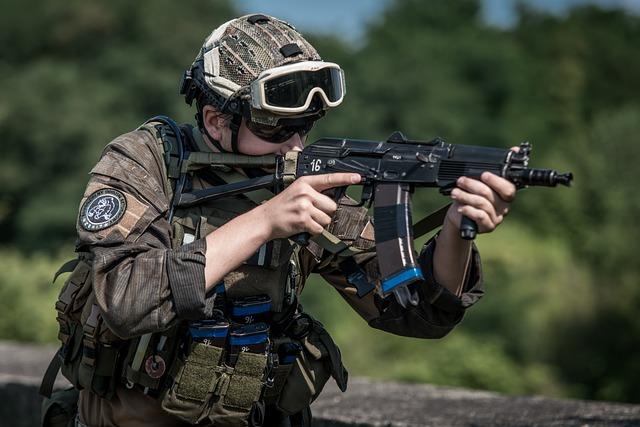Russian Mercenary Convicted: Implications for Worldwide Regulation in Battle Zones
The latest conviction of a Russian mercenary for warfare crimes by a Finnish court docket has sparked important discussions concerning the enforcement of worldwide regulation in battle zones. This landmark case underscores the challenges confronted by nations in holding accountable those that commit atrocities throughout warfare, significantly in areas the place oversight is restricted and geopolitical complexities abound. The Finnish ruling not solely units a precedent for future instances involving personal navy contractors but additionally highlights the hazards related with mercenary involvement in worldwide conflicts,elevating essential questions on state accountability and the efficacy of present frameworks governing armed battle.
Because the worldwide group grapples with the implications of this conviction, it’s important to think about the broader influence on the principles of engagement in warfare. The case may encourage different nations to take a extra energetic function in prosecuting people engaged in comparable actions, probably resulting in a shift in how mercenaries function. Key implications embrace:
Strengthening authorized precedents for prosecuting warfare crimesEncouraging better scrutiny of mercenary teams and their activitiesReinforcing the significance of worldwide accountability mechanismsPromoting consciousness of the necessity for full regulation of personal navy contractors
Insights into the Finnish Authorized Proceedings In opposition to the Mercenary

the authorized proceedings held in Finland have introduced important scrutiny to the actions and penalties surrounding the battle in Ukraine. The trial towards the Russian mercenary, who was discovered responsible of warfare crimes, serves as a vital instance of how worldwide regulation can lengthen past nationwide borders. The Finnish court docket meticulously evaluated proof from a number of sources, emphasizing the significance of witness testimonies and skilled analyses to ascertain a strong case towards the accused. The court docket’s findings highlighted varied types of atrocities allegedly dedicated, together with:
This groundbreaking verdict not solely underscores Finland’s dedication to upholding justice but additionally units a precedent concerning accountability for warfare crimes on a world scale. The implications of this case might lengthen far past Finnland’s borders, doubtlessly influencing how different nations strategy allegations of warfare crimes involving international nationals. Authorized specialists point out that the continued discourse stemming from this ruling might catalyze additional investigations and prosecutions in European courts. As an instance the broader context of warfare crimes in separate areas, the next desk outlines notable instances and their outcomes:
RegionKey IncidentOutcomeFormer YugoslaviaSrebrenica MassacreMultiple convictions, Hague TribunalRwandaRwandan GenocideInternational Felony Tribunal, a number of convictionsSyriaAssad Regime AtrocitiesInvestigations ongoing, some prosecutions in Germany
The Position of Proof and Testimony in Securing a Battle Crimes Verdict

The latest verdict towards a Russian mercenary by a Finnish court docket serves as a vital reminder of the influence that well-presented proof and compelling testimony can have in warfare crimes trials. All through the proceedings, the prosecution meticulously gathered varied types of proof, which included:
Eyewitness accounts from civilians and fellow combatants, detailing the occasions that transpired through the battle.Documentary proof reminiscent of images, movies, and communications that corroborated the testimonies offered.Forensic evaluation that related the defendant to particular warfare crimes, providing tangible proof of their involvement.
As well as to bodily proof, the court docket positioned important weight on the testimonies of witnesses who risked their security to offer a story of the atrocities dedicated. These private accounts served not solely to humanize the statistics surrounding warfare crimes but additionally to embody the ethical outrage necesary for a responsible verdict. The combination of:
Sort of TestimonyImpact on VerdictCivilian witnessesHighlighted the civilian toll and generated empathy.Skilled testimoniesProvided credibility to forensic proof introduced.Navy personnel accountsClarified fight guidelines and obligations, reinforcing authorized requirements.
Affect on Russia-Ukraine Relations and World Perceptions of Accountability

The latest conviction of a Russian mercenary in Finland for warfare crimes dedicated through the ongoing battle in Ukraine marks a big turning level in worldwide perceptions of accountability. This landmark choice underscores the severity of actions taken by international combatants taking part within the preventing, reinforcing that warfare crimes will face scrutiny past the battlefield. Observers consider this ruling might immediate different nations to take decisive steps in holding people accountable, particularly in contexts the place state actors are reluctant to behave. Such authorized actions might doubtlessly result in better worldwide cohesion in addressing war-related violations and should function a deterrent for future participation in mercenary actions in ukraine or elsewhere.
Furthermore, the ramifications of this trial might lengthen to Russia-Ukraine relations by intensifying allegations towards the Kremlin concerning its help for mercenary teams working in Ukraine. Nations backing Ukraine might discover renewed motivation to impose stringent sanctions or improve navy assist, whereas Russia might try to wield propaganda to decrease the implications of this ruling. The fallout may embrace:
Elevated scrutiny of Russian navy operations in Ukraine.Elevated diplomatic tensions between Western nations and Russia.A shift in public opinion concerning the legitimacy of Russia’s actions in Ukraine.
As world consideration shifts towards accountability mechanisms for warfare crimes, the actions taken by Finland’s court docket might catalyze a stronger and extra unified worldwide authorized framework, impacting how nations navigate conflicts and their aftermath by way of justice and worldwide relations.
Suggestions for Strengthening Worldwide Humanitarian Regulation Enforcement

Within the wake of the latest verdict towards a Russian mercenary for warfare crimes in Ukraine,it’s essential for the worldwide group to take actionable steps in the direction of enhancing the enforcement of humanitarian regulation. Nations should strengthen their authorized frameworks by adopting complete measures that guarantee accountability for warfare crimes. Key suggestions embrace:
Bettering collaboration amongst nations to facilitate the arrest and extradition of warfare crime suspects.Establishing specialised worldwide courts or tribunals to deal with instances of warfare crimes extra successfully.Supporting the difference of nationwide authorized programs to include worldwide humanitarian regulation requirements.
Furthermore, fostering consciousness and schooling on humanitarian regulation is important to empower authorized practitioners, navy personnel, and most people. Efficient methods embrace:
Implementing coaching applications for navy and regulation enforcement officers that emphasize compliance with humanitarian regulation.Conducting public consciousness campaigns to tell residents about their rights and the authorized requirements relevant in battle conditions.Encouraging tutorial establishments to supply specialised programs on humanitarian regulation and battle decision.
Way forward for Mercenaries in Fashionable Warfare: Authorized and Moral Concerns

The latest conviction of a Russian mercenary for warfare crimes in Ukraine,as adjudicated by a Finnish court docket,sheds mild on the evolving panorama of mercenary involvement in trendy conflicts. As governments more and more make the most of personal navy firms (PMCs) to meet strategic targets, the authorized legal responsibility of those mercenaries comes into query. The ruling illustrates that mercenaries will not be resistant to accountability for his or her actions in warfare zones, pushing the envelope on how worldwide regulation is interpreted.Key concerns embrace:
Worldwide Regulation compliance: Mercenaries should adhere to the rules outlined in worldwide humanitarian regulation, together with the Geneva Conventions.State Obligation: The actions of PMCs and their personnel might replicate again on the contracting state, elevating issues about governmental complicity in potential human rights abuses.Regulatory Framework: The necessity for clear rules governing the recruitment, deployment, and conduct of mercenaries in battle settings is changing into more and more urgent.
Furthermore, the case highlights the moral dilemmas surrounding the usage of PMCs. Though they’ll supply tactical benefits—reminiscent of specialised expertise and operational versatility—their deployment raises broader societal questions on accountability, ethics in warfare, and the privatization of navy capabilities. Stakeholders should contemplate:
Ethics of Engagement: The morality of hiring personal personnel to conduct navy operations versus conventional state navy forces.Public notion: How ongoing mercenary engagements may erode public belief in nationwide and worldwide navy efforts.Future Precedents: The implications of this ruling might set a judicial precedent for future instances involving mercenaries, influencing world attitudes in the direction of their use.AspectConsiderationLegalAccountability for warfare crimesEthicalMorality of privatized navy operationsSocialImpact on public belief
In Abstract
the conviction of the Russian mercenary by the Finnish court docket underscores the continued authorized and ethical complexities surrounding the battle in ukraine. This landmark case not solely highlights the worldwide group’s dedication to accountability for warfare crimes but additionally raises vital questions in regards to the involvement of mercenaries in trendy warfare. Because the scenario in Ukraine continues to unfold, this ruling might set a precedent for future authorized actions towards international fighters and might affect worldwide relations and techniques going ahead. The implications of this verdict resonate past the courtroom, reflecting broader problems with justice and impunity in battle zones around the globe. As nations grapple with the ramifications of warfare crimes, the worldwide dialogue on accountability and the rule of regulation stays essential in striving for a extra simply and peaceable future.
Source link : https://europ.info/2025/03/23/finland-2/russian-mercenary-found-guilty-of-war-crimes-in-ukraine-by-finland-court-the-new-york-times/
Creator : EURO-NEWS
Publish date : 2025-03-23 15:13:00
Copyright for syndicated content material belongs to the linked Source.




